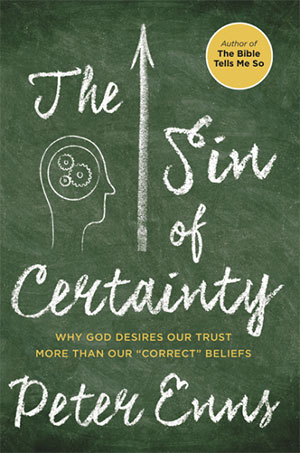 Usually as I read a book that I’m planning to review, I’ll make note of particularly quotable sentences and paragraphs. When I’m done with the book, I’ll have a nice collection of excerpts to build my review around.
Usually as I read a book that I’m planning to review, I’ll make note of particularly quotable sentences and paragraphs. When I’m done with the book, I’ll have a nice collection of excerpts to build my review around.
But after one chapter of Peter Enns’ new book, The Sin of Certainty (HarperOne, $25.99), I realized that approach wouldn’t work — virtually every page offers pithy and profound insight and wisdom.
Finding relevant excerpts to quote for a review wasn’t a matter of plucking a few needles from a haystack, this book is all needles, and sharp ones at that!
Just now I flipped to four random pages that contained these gems:
“The problem is trusting our beliefs rather than trusting God” (21)
“The long Protestant quest to get the Bible right has not led to greater and greater certainty about what the Bible means. Quite the contrary. It has led to a staggering number of different denominations and sub denominations that disagree sharply about how significant portions of the Bible should be understood. I mean, if the Bible is our source of sure knowledge about God, how do we explain all this diversity? Isn’t the Bible supposed to unify us rather than divide us?” (52)
“Life’s challenges mock and then destroy a faith that rests on correct thinking and the preoccupation with defending it. And this is a good thing. Life’s challenges clear the clutter so we can see more clearly that faith calls for trust instead.” (116)
“All Christians I’ve ever met who take their faith seriously sooner or later get caught up in thinking that God really is what we think God is, that there is little more worth learning about the Creator of the cosmos. God becomes the face in the mirror. By his mercy, God doesn’t leave us there.” (159)
Let me be blunt: The Sin of Certainty is a good book. Maybe not the greatest theological treatise ever written, but it was packed full of enough spiritual reflection, historical context, and biblical insight to keep me thinking about it long after I finished reading it.
That’s not to say this is a difficult book. To the contrary, it’s extraordinarily readable, and that simplicity is one of its strengths. Enns writes with an honesty and forthrightness that is refreshingly free of theological jargon and Christian buzzwords.
It’s that honesty — about the shortcomings of Christianity, about the messy book that is the Bible, and about his own personal spiritual struggles — that sets The Sin of Certainty apart as something far more important than just another book about Christian spirituality.
Enns readily admits that he doesn’t have all the answers when it comes to matters of faith — a bold admission from someone who has devoted his life to studying Christianity. But that’s precisely the point of the book: that answers, truth, orthodoxy, correctness, doctrine, and dogma — the very factors that serve as hallmarks of modern Christendom — simply can’t continue to remain at the center of Christianity.
Enns encourages Christians to take a step back from manning the walls of religious truth, from fearing doubt, and from condemning uncertainty, and to instead engage with faith as a matter of a trust and relationship: “trust in God, not correct thinking about God, is the beginning and end of faith, the only true and abiding path.”
If you’ve ever had doubts about your faith, if you’ve never had doubts about your faith, or if you’ve always had doubts about your faith — and that should include pretty much every Christian ever — then The Sin of Certainty was written for you.
Find out more about The Sin of Certainty at HarperCollins and more about Peter Enns at peteenns.com.
 Dan Wilkinson
Dan Wilkinson
Dan is the Executive Editor of the Unfundamentalist blog. He is a writer, graphic designer and IT specialist. He lives in Montana, is married and has two cats.
Leave a Reply